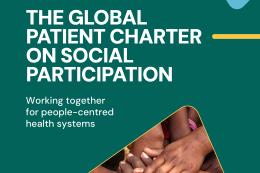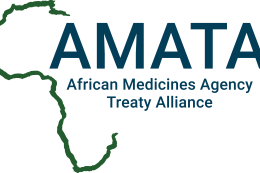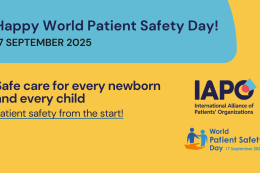World Patient Safety Day 2025 | Patient safety from the start!

Today marks the seventh annual World Patient Safety Day, and the International Alliance of Patients' Organisations (IAPO) stands with health advocates worldwide to address a pressing global challenge: ensuring the safety of our youngest and most vulnerable patients.
The urgent need for action
Recent evidence reveals alarming safety risks facing newborns and children. Studies indicate that adverse events occur in up to 91.6% of paediatric intensive care cases, (1) with neonatal units experiencing as many as 2.4 adverse events per patient admission (2). In low- and middle-income countries, healthcare-associated infections in newborn units contribute to between 4% and 56% of deaths within the first month of life (3).
These statistics represent preventable harm that could be eliminated through targeted safety improvements. Studies demonstrate that enhanced safety and quality measures could save up to one million newborn lives annually (4).
Amplifying children, family and community voices
Yesterday, IAPO and the Patients for Patient Safety Observatory hosted a global webinar bringing together leading experts from the World Health Organization (WHO), UNICEF Montenegro, Joint Commission International and the International Children's Advisory Network (iCAN). The event reinforced our core belief that sustainable safety improvements require placing children, families and communities at the heart of healthcare transformation.
Young patients from birth to nine years face unique developmental, physiological, and communication challenges that standard adult-focused protocols often overlook. Healthcare systems must design specialised approaches to medication safety, infection prevention, diagnostic procedures, and clinical monitoring that account for children's specific needs.
IAPO's approach recognises that children and families are essential partners, not passive recipients of care. Their lived experiences and insights are irreplaceable components of effective safety strategies. Family and community involvement must be foundational to safe paediatric healthcare delivery, requiring healthcare organisations to develop new competencies in family engagement, shared decision-making, and collaborative care planning.
Call to Action
Safer care for newborns and children begins with empowered children, families and communities. On World Patient Safety Day 2025, IAPO calls on:
Governments and health systems to embed family and community engagement as a cornerstone of safe paediatric and neonatal care policies and implementation strategies.
Healthcare organisations and professionals to partner authentically with patients and families in care planning, recognising their irreplaceable role in preventing harm and ensuring continuity of safe care.
Academic and research institutions to prioritise studies exploring patient and family experiences, generating robust evidence on how meaningful engagement improves safety outcomes for children.
Families, caregivers and communities to advocate actively, share experiences openly, and take active roles in co-creating safer care environments for all children.
Civil society and patient organisations to build strong networks of patient safety advocates and champions, connect with the WHO Patients for Patient Safety programme, amplify family stories, and sustain advocacy that keeps family engagement central to the global patient safety agenda.
Every child deserves healthcare that protects and nurtures their potential. Today and every day, IAPO remains committed to making this vision a reality through advocacy, partnership building, and amplifying the voices of patients, families and communities worldwide.
References
-
Dillner P, Eggenschwiler LC, Rutjes AWS, Berg L, Musy SN, Simon M et al. Incidence and characteristics of adverse events in paediatric inpatient care: a systematic review and meta-analysis. BMJ Qual Saf. 2023;32:133–49. doi: 10.1136/bmjqs-2022-015298.
-
Sharek PJ, Horbar JD, Mason W, Bisarya H, Thurm CW, Suresh G, et al. Adverse events in the neonatal intensive care unit: development, testing, and findings of an NICU-focused trigger tool to identify harm in North American NICUs. Pediatrics. 2006 Oct;118(4):1332-40. doi:10.1542/peds.2006-0565. PMID: 17015521.
-
Alghamdi AA, Keers RN, Sutherland A, Ashcroft DM. Prevalence and nature of medication errors and preventable adverse drug events in paediatric and neonatal intensive care settings: a systematic review. Drug Saf. 2019 Dec;42(12):1423-1436. doi:10.1007/s40264-019-00856-9. PMID: 31410745.
-
World Health Organization. Global patient safety report 2024. Geneva: World Health Organization; 2024. Available from: https://www.who.int/publications/i/item/9789240095458.



